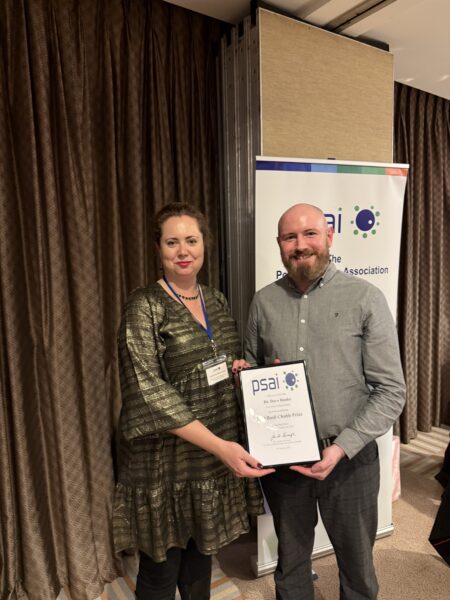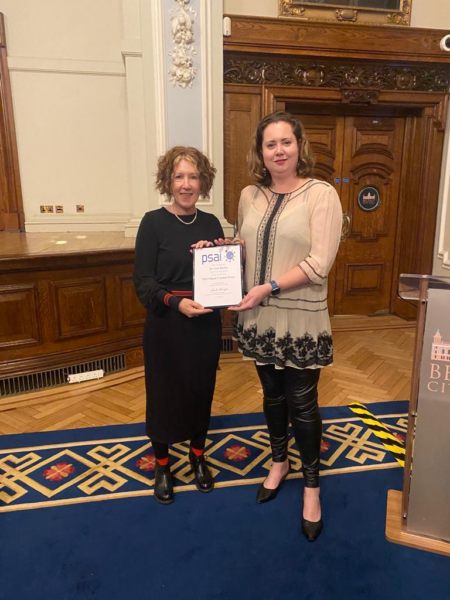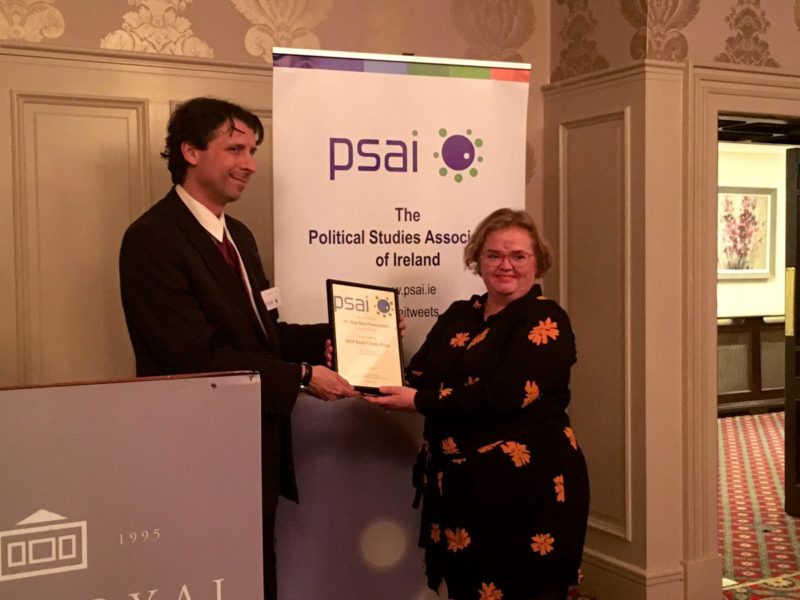Basil Chubb prize
The Political Studies Association of Ireland has established an annual award to recognise the best PhD thesis (produced in an Irish university) in any field of politics. The award will take the form of a cheque for €400.
Deadline for nominations: 30 June
The PSAI is grateful to Taylor & Francis for generously sponsoring this prize.
Named after Basil Chubb, this award seeks to recognise an outstanding contribution to the research of politics undertaken in Ireland.
Following a history degree and doctorate in politics at Oxford University, Basil Chubb was appointed as lecturer in politics at Trinity College Dublin in 1948. In 1960 he was appointed Professor of Political Science, and first Chair of the new Department of Political Science at TCD. He headed the department until 1991. Widely described as the doyen of Irish political science, Basil Chubb’s major books included “The Government and Politics of Ireland”, “A Source Book of Irish Government”, “Cabinet Government in Ireland” and “The Politics of the Irish Constitution”.
A frequent broadcaster during Irish election campaigns, Professor Chubb is credited with the development of a popular interest in and understanding of the Irish political process.
Basil Chubb died in 2002 at the age of 80, but his legacy lives on both in his writings and through his former colleagues and students.
Nominations for the PhD prize are sought from PhD thesis supervisors each year. Nominations should be sent to Jennifer Kavanagh (psaipresident@gmail.com).
The judging process is as follows:
- Each PhD thesis supervisor may make one nomination for the award each year. The nomination will consist of a letter of recommendation from the supervisor (certifying that the candidate was awarded a PhD from that Department in the previous calendar year), along with a copy of all reports on the thesis from internal and external examiners, and with one copy of the thesis itself. (All nomination material will of course be held in absolute confidence by the PSAI save for the purposes of its internal judging process.) Following the judging process all examiners’ reports will be destroyed, and the copy of the thesis returned to the supervisor.
- Each nomination will be assessed by a team of three judges. The judging panel will make a recommendation to the PSAI committee, which will then decide the recipient of the Basil Chubb Prize. (The PSAI reserves the right not to make any award in a particular year.)
Please note that nominees must be members of the PSAI.
Prize Recipient
The 2024 Basil Chubb Prize for best PhD thesis at an Irish university was awarded to Dr Dave Banks (UCD) for his dissertation: Integrated Team Sport and Intergroup Relations in a Post Conflict Society: The Case of Club Rugby in Northern Ireland.

Previous Winners
The 2023 Basil Chubb Prize for best PhD thesis at an Irish university was awarded to Dr Gail Ritchie (QUB) for her dissertation: The (im)material monument: A practice-based engagement with Troubles commemoration.

The 2022 Basil Chubb prize for best PhD thesis at an Irish university in 2021 has been awarded to Dr Matt York (UCC) for his dissertation: Imagining New Worlds: (R)evolutionary Love and Radical Social Transformation in the 21st Century.
The 2021 Basil Chubb prize for best PhD thesis at an Irish university in 2020 has been awarded to Dr Mary Brennan (UCD) for her dissertation: Progress or Tokenism: Assessing the impacts of intra-party processes on gender quota schemes

The 2020 Basil Chubb prize for best PhD thesis at an Irish university in 2019 has been awarded to Dr Alan Duggan (TCD) for his dissertation: Campaign Spending and Electoral Integrity: Assessing the Plausibility of the Challenger Spending Efficacy Advantage in Irish & British Elections.

The 2019 Basil Chubb prize for best PhD thesis at an Irish university in 2018 has been awarded to Dr Silja Bára Ómarsdóttir, (UCC) for her dissertation: Icelandic Security Discourses: A Grounded Theoretical Analysis.

The 2018 Basil Chubb prize for best PhD thesis at an Irish university in 2017 has been awarded to Dr Sean Brennan, (QUB) for his dissertation: ‘Ulster’s Uncertain Menders?: The challenge of reintegration and reconciliation for Ulster Loyalists in a Post-Ceasefire Society’.

The 2017 Basil Chubb prize for best PhD thesis at an Irish university in 2016 has been awarded to Dr. Cathal FitzGerald, (DCU) for his dissertation ‘Leading to Crisis – Decision Making in Ireland’s Celtic Tiger’.
2016
The 2016 Basil Chubb prize for best PhD thesis at an Irish university in 2015 was awarded to Dr. Jessica Doyle, (UCD), for her thesis “Civil Society Organizations, the State and Democracy: The Case of Turkey”.

2015
The winner of the 2015 Basil Chubb prize for best PhD thesis at an Irish university in 2014 was awarded to Jennifer Carroll MacNeill of University College Dublin for: Institutional Change in Judicial Selection Systems: Ireland in Comparative Perspective.
2014
The winner of the 2014 Basil Chubb prize for best PhD thesis at an Irish university in 2013 was Erin Baumann who completed her PhD in University College Dublin (UCD). The title of Erin’s thesis is: “Between Politics and a Hard Place: influences, institutions, and foreign policies in post-Soviet Eastern Europe”.
2013
The winner of the 2013 Basil Chubb prize for best PhD thesis at an Irish university in 2012 was Dr. Walt Kilroy, of the School of Law and Government, Dublin City University for his thesis: “From Conflict to Ownership: Participatory approaches to the reintegration of ex-combatants in Sierra Leone and Liberia”.
2012
The winner of the 2012 Basil Chubb prize for best PhD thesis at an Irish university in 2011 was Dr. Iosif Kovras who completed his PhD in Queen’s University Belfast (QUB). The title of Iosif’s thesis was Unearthing the Truth: The Politics of Exhumations in Cyprus and Spain.
2011
The winner of the 2011 Basil Chubb prize for best PhD thesis at an Irish university in 2011 was Dr. Michael Breen who completed his PhD in University College Dublin in December 2010. The title of Michael’s thesis is: “The Political Logic of IMF Lending and Conditionality”. The judging panel all agree that the thesis represents an outstanding contribution to political research.
2010
The winner of the 2010 Basil Chubb prize was Dr. Catherine O’Rourke of the Transitional Justice Institute at the University of Ulster for her thesis: “The Law and Politics of Gender in Transition: A Feminist Exploration of Transitional Justice in Chile, Northern Ireland and Colombia”.
2009
The winner of the 2009 Basil Chubb prize was Dr. Oliver Feeney for his thesis: “Equality of whom? A Genetic perspective on equality of Opportunity”. The thesis considers central arguments in political philosophy – justice and equality of opportunity – and gives them a new twist by exploring the implications for them of possible advances in genetic technology. If we have a society in which the genetic properties of people are under human control, the thesis asks, how would this make us rethink our core intuitions about justice and equality of opportunity? As the examiners put it, the thesis “shows an outstanding command of a complex philosophical literature… and advances a number of original, sophisticated and thought-provoking arguments”.
2008
The winner of the 2008 Basil Chubb prize was Brighid Brooks-Kelly for her thesis: “An Exploration of the Relationship between Consociationalism and Stability in Plural Societies throughout the World”. The thesis attempted to test empirically the popular and highly influential theory of consociationalism developed by Arend Lijphart in the 1970’s. The theory holds that certain institutional structures will be associated with peace and democratic stability in plural or heterogeneous societies. Surprisingly this theory, developed with Switzerland, the Netherlands and Belgium in mind has never been tested on a large number of cases. This was a serious criticism acknowledged by Lijphart him self in 2002. Brooks-Kelly operationalises Lijphart’s prescriptive assertions and tests them against data in a detailed and rigorous manner and shows that some consociational measures may be less associated with stability than the theory suggests. She finds that only power-sharing is conducive to stability, whereas PR electoral systems and mutual veto are not, and segmental autonomy is insignificant. She supplements this with detailed case studies from seven countries, and she also offers a discussion of her finding which indicates why not all consociational instruments may not be conducive to stability in plural societies. The rigor Brooks-Kelly displays in to a research question of real academic and practical importance results in a very important piece of work and one worthy of Basil Chubb prize.
2007
The winner of the 2007 Basil Chubb Prize was Joanne McEvoy for her thesis: “Power Sharing in Northern Ireland: design, operation and proposals 1999-2006”‘.
2006
The first recipient of the Basil Chubb prize in 2006 was Eoin O’Malley for his Trinity College Dublin thesis: “Give Them Awkward Choices: A Theoretical and Empirical Investigation into the Operation of Prime Ministerial Influence”.
Honorable Mentions went in 2006 to Vanya Harte (UCD) for “The Development of Immigration Controls in Britain 1880-1905″, and to Barry J. Ryan (University of Limerick) for: “Police Reform in the Republic of Serbia: A Participatory Perspective”.